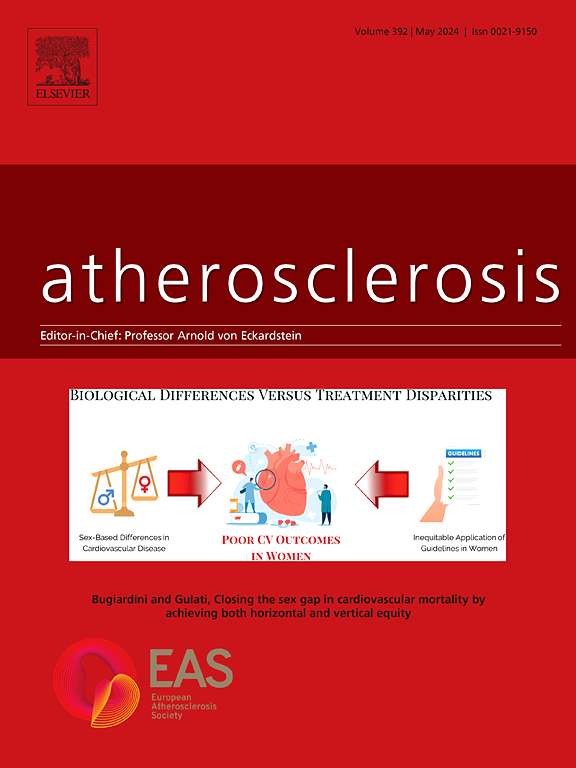纯合子家族性高胆固醇血症妇女的现实世界计划生育和妊娠实践
IF 4.9
2区 医学
Q1 CARDIAC & CARDIOVASCULAR SYSTEMS
引用次数: 0
摘要
背景和目的:纯合子家族性高胆固醇血症(HoFH)以极高的血浆低密度脂蛋白胆固醇(LDL-C)水平和高的过早动脉粥样硬化性心血管疾病风险为特征。在怀孕期间,LDL-C水平升高,而可用的治疗选择有限。这项国际研究记录了目前卫生保健专业人员(HCPs)在HoFH计划生育、怀孕和母乳喂养方面的方法。方法在HoFH国际临床合作者(HICC, NCT04815005)中进行在线HCP调查。根据医务人员的性别、医学专业、国家收入状况和世界地区对反馈进行分析。结果共有来自48个国家的87名医务人员(39.1%为女性)参加了调查,其中高收入国家占64.4%。大多数HCPs(79.3%)总是与HoFH患者讨论计划生育问题。大多数(72.4%)推荐避孕,其中最常推荐的是宫内节育器(50.8%)和口服避孕药(49.2%)。如果ASCVD风险过高,三分之一的HCPs会建议不要怀孕。除了脂蛋白分离和colesevilam,大多数HCPs会建议在受孕、怀孕和哺乳期间停止LLT。然而,大约30%的医生建议在怀孕和哺乳期间继续或重新开始使用他汀类药物和/或依zetimibe,尽管在怀孕和哺乳期间有限制使用的标签。近一半(48.3%)的HCPs会建议HoFH妇女缩短母乳喂养期,以便更早地恢复LLT,高收入国家的HCPs更有可能这样做(51.8%对41.9%;p = 0.008)。结论:本研究强调了育龄妇女HoFH管理的显著差异,特别是在受孕、妊娠和哺乳期间使用LLT。研究结果强调需要进一步研究,以建立适合个人需求的全球循证指南,以改善全球HoFH妇女的心血管风险管理和生殖健康结果。本文章由计算机程序翻译,如有差异,请以英文原文为准。

Real-world family planning and pregnancy practices in women with homozygous familial hypercholesterolemia
Background and aims
Homozygous familial hypercholesterolemia (HoFH) is characterized by extremely high plasma low-density lipoprotein cholesterol (LDL-C) levels and high premature atherosclerotic cardiovascular disease risk. During pregnancy LDL-C levels increase, while limited therapeutic options are available. This international study documented current approaches of healthcare professionals (HCPs) to family planning, pregnancy, and breastfeeding in HoFH.
Methods
An online HCP survey was distributed among the HoFH International Clinical Collaborators (HICC, NCT04815005). Responses were analyzed according to HCPs’ gender, medical specialty, country income status, and world region.
Results
In total, 87 HCPs (39.1 % women) from 48 countries participated (64.4 % practicing in high-income countries). Most HCPs (79.3 %) always discuss family planning with patients with HoFH. Most (72.4 %) recommend contraception, with intrauterine devices (50.8 %) and oral contraceptives (49.2 %) being most commonly recommended. One in three HCPs would advise against pregnancy if ASCVD risks were deemed too high. Except for lipoprotein apheresis and colesevelam, most HCPs would recommend discontinuing LLT during the conception, pregnancy, and breastfeeding periods. However, approximately 30 % advise continuation or reinitiation of statins and/or ezetimibe during pregnancy and breastfeeding despite labelled restrictions on use during pregnancy and breastfeeding. Nearly half (48.3 %) of HCPs would recommend that women with HoFH shorten the breastfeeding period to resume LLT earlier, with HCPs from high-income countries significantly more likely to do so (51.8 % vs. 41.9 %; p = 0.008).
Conclusions
This study highlights significant variability in the management of HoFH in women of childbearing age, especially concerning LLT use during conception, pregnancy, and breastfeeding. The findings underscore the need for further research to establish global evidence-based guidelines tailored to individual needs, to improve cardiovascular risk management and reproductive health outcomes for women with HoFH worldwide.
求助全文
通过发布文献求助,成功后即可免费获取论文全文。
去求助
来源期刊

Atherosclerosis
医学-外周血管病
CiteScore
9.80
自引率
3.80%
发文量
1269
审稿时长
36 days
期刊介绍:
Atherosclerosis has an open access mirror journal Atherosclerosis: X, sharing the same aims and scope, editorial team, submission system and rigorous peer review.
Atherosclerosis brings together, from all sources, papers concerned with investigation on atherosclerosis, its risk factors and clinical manifestations. Atherosclerosis covers basic and translational, clinical and population research approaches to arterial and vascular biology and disease, as well as their risk factors including: disturbances of lipid and lipoprotein metabolism, diabetes and hypertension, thrombosis, and inflammation. The Editors are interested in original or review papers dealing with the pathogenesis, environmental, genetic and epigenetic basis, diagnosis or treatment of atherosclerosis and related diseases as well as their risk factors.
 求助内容:
求助内容: 应助结果提醒方式:
应助结果提醒方式:


